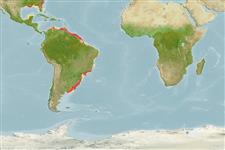Lớp phụ Cá sụn (cá mập và cá đuối) (sharks and rays) >
Myliobatiformes (Stingrays) >
Myliobatidae (Eagle and manta rays)
Etymology: Myliobatis: Greek, mylo = mill + Greek, + Greek, batis,-idos = a ray (Raja sp.) (Ref. 45335).
Eponymy: Dr George Brown Goode (1851–1896) was an American ichthyologist and museum administrator at the Smithsonian. [...] (Ref. 128868), visit book page.
More on author: Garman.
Environment: milieu / climate zone / depth range / distribution range
Sinh thái học
Biển Sống nổi và đáy; Mức độ sâu 1 - 130 m (Ref. 57911). Tropical; 33°N - 40°S, 180°W - 180°E
Worldwide in tropical waters. Western Atlantic: South Carolina, USA to Argentina. Often confused with Myliobatis freminvillii.
Bộ gần gũi / Khối lượng (Trọng lượng) / Age
Maturity: Lm ? range ? - ? cm
Max length : 125 cm TL con đực/không giới tính; (Ref. 57911); common length : 80.0 cm WD con đực/không giới tính; (Ref. 6077)
Smaller dorsal fin set farther back on tail, well beyond the pelvic fins. Disk broader, with more rounded corners of wings. Snout less projecting. No spines on disk (Ref. 7251). Broader separation between the inner ends of gill openings. Chocolate or greyish brown above and brownish white below (Ref. 6902).
Ovoviviparous (Ref. 50449). In coastal waters down to 130 m.
Life cycle and mating behavior
Chín muồi sinh dục | Sự tái sinh sản | Đẻ trứng | Các trứng | Sự sinh sản | Ấu trùng
Exhibit ovoviparity (aplacental viviparity), with embryos feeding initially on yolk, then receiving additional nourishment from the mother by indirect absorption of uterine fluid enriched with mucus, fat or protein through specialised structures (Ref. 50449).
Robins, C.R. and G.C. Ray, 1986. A field guide to Atlantic coast fishes of North America. Houghton Mifflin Company, Boston, U.S.A. 354 p. (Ref. 7251)
IUCN Red List Status (Ref. 130435: Version 2024-1)
Threat to humans
Harmless
Human uses
Các nghề cá: buôn bán nhỏ
Các công cụ
Special reports
Download XML
Các nguồn internet
Estimates based on models
Preferred temperature (Ref.
123201): 13.3 - 27.8, mean 24.4 °C (based on 732 cells).
Phylogenetic diversity index (Ref.
82804): PD
50 = 0.5002 [Uniqueness, from 0.5 = low to 2.0 = high].
Bayesian length-weight: a=0.00389 (0.00119 - 0.01269), b=3.08 (2.83 - 3.33), in cm total length, based on LWR estimates for this (Sub)family-body shape (Ref.
93245).
Mức dinh dưỡng (Ref.
69278): 3.3 ±0.34 se; based on food items.
Thích nghi nhanh (Ref.
120179): Rất thấp, thời gian nhân đôi của chủng quần tối thiểu là hơn 14 năm (Fec assumed to be <10).
Fishing Vulnerability (Ref.
59153): High to very high vulnerability (75 of 100).
Nutrients (Ref.
124155): Calcium = 22.5 [6.6, 112.7] mg/100g; Iron = 0.637 [0.161, 1.754] mg/100g; Protein = 20.6 [15.6, 25.8] %; Omega3 = 0.153 [0.043, 0.476] g/100g; Selenium = 61.5 [15.7, 183.1] μg/100g; VitaminA = 14.3 [5.5, 36.8] μg/100g; Zinc = 0.875 [0.426, 1.585] mg/100g (wet weight);
